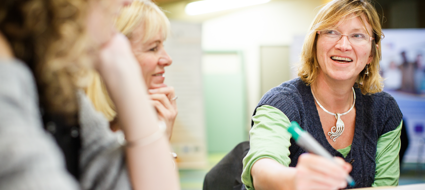Reflective structures that enhance local innovation
This collection of video resources shares the developing findings of the Innovate Project, about how social care and other safeguarding agencies are innovating to address extra-familial risk and harm.
The Innovate Project is a four-year UK study funded by the Economic and Social Research Council (ESRC) which is exploring how social care and other safeguarding agencies are innovating to address harms that young people may encounter and experience beyond the family home. Find out more, about the Innovate Project.
In these clips, Professor Gillian Ruch considers the presence and significance of emotions during innovation, and how the researchers used regular meetings, journey mapping and reflective spaces to support the emotional impact of innovation work. These practices could support leaders and practitioners during design, planning and review of innovation in your local context.
Indeed we would go so far as to say that unless the emotional impact of the work is acknowledged by practitioners, and responded to by senior leaders, it is highly likely that it will, in unconscious ways, impede the progress of innovative practices. (Ruch et al., forthcoming)
Three conceptual frameworks for research in organisations
Gillian Ruch shares three conceptual frameworks that underpinned this work: learning partnerships, para-ethnography and the analytic third.
(Length: 8 minutes)
The role of regular meetings in building research partnerships
Gillian Ruch talks about the importance of meeting regularly during innovation, to build relationships that are based on trust and reciprocity. She shares quotes from participants about the impact that this had on them and their ability to be innovative.
(Length: 9 minutes)
Using journey mapping as a tool to support reflexive innovation
Gillian Ruch explores a journey mapping exercise used by local authorities during the project, a way of mapping the development journey they had over time that considers:
- the different phases of innovation
- detail of what happened at each phase
- feelings and emotions across the innovation journey
- opportunities and challenges across the journey.
It was a tool that encouraged reflection, gave participants the opportunity to talk about the emotions they experienced during innovation work, and supported local authorities to consider what they would do differently in future.
(Length: 6 minutes)
Reflective discussion groups: Getting beneath the surface of innovation practices
Gillian Ruch talks about the importance of creating reflective spaces for people involved in innovation, particularly in Transitional Safeguarding. She talks about how this supported work in ‘borderline spaces’, supported participants to recognise intuition and ignite imagination, and supported both realism and tenacity.
(Length: 15 minutes)
Reflective questions
- How do these insights resonate with your experience of being engaged in research projects or practice innovation / improvement activities?
- What is your experience of emotions being attended to in your workplace?
- How could you use regular meetings, reflective spaces and journey mapping to support innovation in your organisation, team or practice?
About the presenter
Prof. Ruch is Professor of Social Work at the University of Sussex where she directs the Centre for Social Work Innovation and Research. She trained originally as a social worker, practising in local authority posts in London and Essex before moving into academia. Her particular interests are in reflective and relationship-based practice and psychosocial research and reflective practice in social work.
Professional Standards
PCF - Contexts and organisations | Professional leadership




